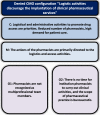Implementation of pharmaceutical care for older adults in the brazilian public health system: a case study and realistic evaluation
- PMID: 31937299
- PMCID: PMC6958615
- DOI: 10.1186/s12913-020-4898-z
Implementation of pharmaceutical care for older adults in the brazilian public health system: a case study and realistic evaluation
Abstract
Background: Pharmaceutical care services have been recognized as the most highly regarded professional pharmacy practice model that allows the identification, intervention, and resolution of drug related problems. This practice provides significant clinical outcomes and can reduce direct and indirect costs for health systems. However, its implementation can be complex and challenging, needing study experiences that aims at overcoming obstacles, especially in free and universal healthcare systems. The objective of this study is to evaluate the implementation of Ambulatory Care Pharmacy services for older adults at Paulista Institute of Geriatrics and Gerontology (IPGG), which is recognized in the city of São Paulo for offering pharmaceutical care services for over 10 years continuously. This initiative and process is independent of external academic interventions or educational institutions. It is hoped that the results may also contribute to advancing the implementation of pharmaceutical care service in similar health systems.
Design: This is a case study using multiple sources of data. Qualitative and quantitative data were collected from institutional documents, by participant observation and interviews. Initial themes were identified by content analysis and analyzed under the context-mechanism-outcome configurations (CMO Configurations) in realistic evaluation.
Setting: Geriatrics and Gerontology Institute of São Paulo (known as IPGG).
Participants: Eleven health professionals and three pharmaceutical care service users.
Results: Three CMO configurations were identified and accepted: "Scenario Construction mediated by educational processes", "Contribution to complex needs resolution", and "Organizational Visibility". The CMO (Context-Mechanism-Outcomes) configuration "Logistic activities discourage clinical pharmaceutical services implantation" was denied due to the influence of accepted CMOs.
Conclusions: Educational processes which value transdisciplinary knowledge exchanges provide resources required to overcome important obstacles present during pharmaceutical care implementation. Thus, providing and seeking knowledge to build and offer context-consistent clinical health services as well as fulfilling organizational environment requirements can be the key to implement pharmaceutical care service.
Keywords: Evaluation; Organizational innovation; Patient care team; Pharmaceutical care.
Conflict of interest statement
The authors declare that they have no competing interests.
Figures




Similar articles
-
Identifying models of care to improve outcomes for older people with urgent care needs: a mixed methods approach to develop a system dynamics model.Health Soc Care Deliv Res. 2023 Sep;11(14):1-183. doi: 10.3310/NLCT5104. Health Soc Care Deliv Res. 2023. PMID: 37830206 Review.
-
Perceptions of a group of hospital pharmacists and other professionals of the implementation of clinical pharmacy at a high complexity public hospital in Brazil.BMC Health Serv Res. 2018 Apr 4;18(1):242. doi: 10.1186/s12913-018-3036-7. BMC Health Serv Res. 2018. PMID: 29618345 Free PMC article.
-
Pharmaceutical services in a capitated geriatric care program.Am J Health Syst Pharm. 1996 Dec 1;53(23):2848-52. doi: 10.1093/ajhp/53.23.2840. Am J Health Syst Pharm. 1996. PMID: 8957345
-
The future of Cochrane Neonatal.Early Hum Dev. 2020 Nov;150:105191. doi: 10.1016/j.earlhumdev.2020.105191. Epub 2020 Sep 12. Early Hum Dev. 2020. PMID: 33036834
-
Developing a business-practice model for pharmacy services in ambulatory settings.Pharmacotherapy. 2008 Feb;28(2):285. doi: 10.1592/phco.28.2.285. Pharmacotherapy. 2008. PMID: 18225974 Review.
Cited by
-
EMDIA Case Series-Effective Medication Therapy Management (MTM) for Diabetes Type 2 Patients-A Proof of Concept Study.Pharmacy (Basel). 2021 Aug 9;9(3):137. doi: 10.3390/pharmacy9030137. Pharmacy (Basel). 2021. PMID: 34449695 Free PMC article.
-
Comprehensive Medication Management Services with a Holistic Point of View, a Scoping Review.Pharmacy (Basel). 2023 Feb 16;11(1):37. doi: 10.3390/pharmacy11010037. Pharmacy (Basel). 2023. PMID: 36827675 Free PMC article.
-
Construction and validation of an instrument to identify barriers to implementing pharmaceutical care.Explor Res Clin Soc Pharm. 2024 Oct 18;16:100529. doi: 10.1016/j.rcsop.2024.100529. eCollection 2024 Dec. Explor Res Clin Soc Pharm. 2024. PMID: 39512514 Free PMC article.
-
Pharmacists' readiness to deal with the coronavirus pandemic: Assessing awareness and perception of roles.Res Social Adm Pharm. 2021 Mar;17(3):514-522. doi: 10.1016/j.sapharm.2020.04.020. Epub 2020 Apr 23. Res Social Adm Pharm. 2021. PMID: 32360181 Free PMC article.
-
Hospital pharmacists' awareness and perspective toward the management of COVID-19 pandemic in the Kingdom of Saudi Arabia.Pharm Pract (Granada). 2022 Jul-Sep;20(3):2709. doi: 10.18549/PharmPract.2022.3.2709. Epub 2022 Sep 1. Pharm Pract (Granada). 2022. PMID: 36733526 Free PMC article.
References
-
- OMS. WHO . WHO Global Patient Safety Challenge: Medication Without Harm. 2017. - PubMed
-
- Chinthammit C, Armstrong EP, Boesen K, Martin R, Taylor AM, Warholak T. Cost-effectiveness of comprehensive medication reviews versus noncomprehensive medication review interventions and subsequent successful medication changes in a Medicare Part D population. J Manag Care Spec Pharm. 2015;21:381–389. doi: 10.18553/jmcp.2015.21.5.381. - DOI - PMC - PubMed
MeSH terms
LinkOut - more resources
Full Text Sources
Miscellaneous

